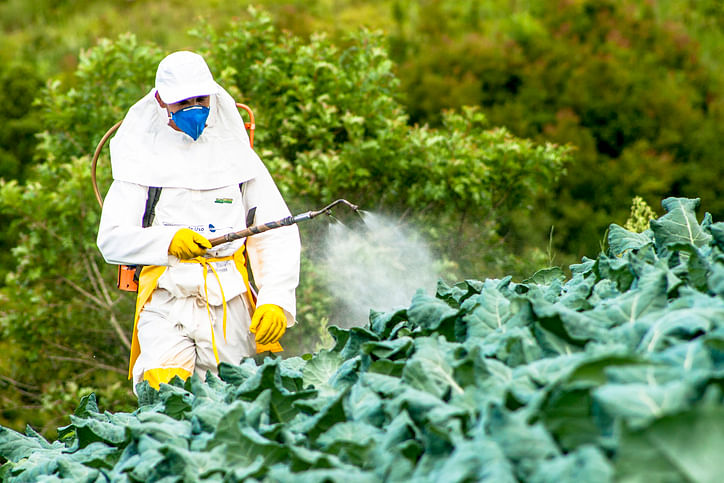
After donating consignments of Paracetamol and Hydroxychloroquine (HCQ) drugs to friendly nations around the world to support fight against the COVID-19 pandemic; India has now offered to send pesticides to the countries in its neighbourhood to help them fight another menace – swarms of crop-devouring desert locusts that now pose a grave threat to food security in South Asia.
India is sending a consignment of pesticides to Iran to help the West Asian nation save its crops from being ravaged by swarms of desert locusts, although it has not yet received a positive response to a similar offer of support it made to Pakistan.
Pakistan earlier sought to block attempts by India to work with all other South Asian nations and work out a regional strategy to counter the COVID-19 pandemic.
The Hindustan Insecticides Limited (HIL) – a public sector undertaking under the Ministry of Chemicals and Fertilizers of the Government of India – is now in the process of production and supply of 25 MT of “Malathion Technical” pesticide to support locust control programme in Sistan-Balochistan and South Khorasan provinces of Iran. The Ministry of External Affairs (MEA) has asked the HIL to produce and supply the consignment of the pesticides to the West Asian nation, after Tehran positively responded to New Delhi’s proposal for a coordinated response to the menace of desert locusts.
Pakistan, however, cold-shouldered India’s proposal to strengthen bilateral institutional mechanisms to coordinate responses to attacks by the locusts as well as its offer to supply pesticides. It rather indicated that it would rely on its “all-weather friend” China.
China so far donated 300 tons of locust control pesticides to Pakistan, along with 350 vehicle-mounted sprayers. The Chinese Government also sent a team of locust control experts to Pakistan to help local officials deal with the menace.
Even as the world is grappling to contain the Covid-19 pandemic and bracing to deal with its impact on the economy, the Food and Agriculture Organization (FAO) of the United Nations has warned Kenya, Ethiopia, Somalia, Iran, Pakistan and India about an invasion by the swarms of desert locusts, which, according to it, is going to be much worse than normal, possibly the worst in decades.
The FAO reported that hopper bands of the locusts were maturing along the southwestern coastal plains in Iran, while another generation of breeding was underway in the southeast of the West Asian nation with hatching taking place on the coast and in the interior of the country’s Sistan-Baluchistan province. The adult groups were migrating from spring breeding areas in Balochistan province of Pakistan to summer breeding areas near the country’s border with India. The hopper groups were also present in Punjab and Khyber Pakhtunkhwa in Pakistan, according to the UN agency.
The adult groups and small swarms already reached India from Pakistan in the past weeks, ravaging crops in Madhya Pradesh and Rajasthan and posing a grave threat to Maharashtra as well.
The desert locust is the most dangerous and voracious migratory pest of the world, with a geographical range that could cover the equivalent of 20 percent of the surface of the earth. The swarms of desert locusts can travel up to 150 kilometres every day in search of food, migrating across long distances and even spreading from one continent to another.
India already has an existing institutionalized mechanism with Pakistan for bilateral cooperation to deal with raids by desert locusts, including holding six meetings on the border between plant protection advisors and other officials of the two nations for exchange of information. The two sides also maintain wireless communication between officials in Jodhpur (India) and Karachi (Pakistan) every year during the period from June to November every year.
New Delhi offered to build on the mechanism to coordinate a stronger response to the swarms of locusts, which, according to the experts, might pose a grave threat to food security in South Asia.
Pakistan, however, did not respond to the offer from India.
